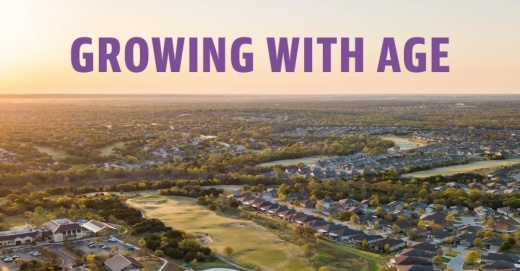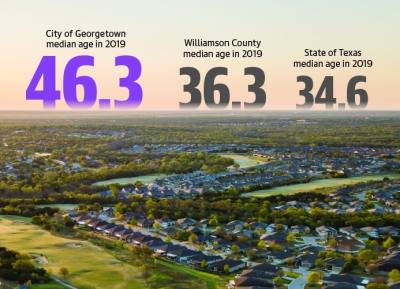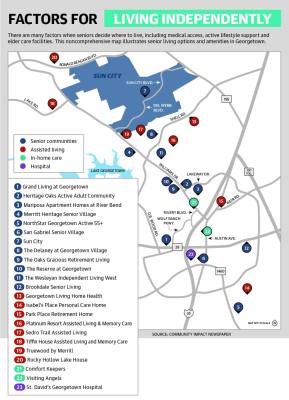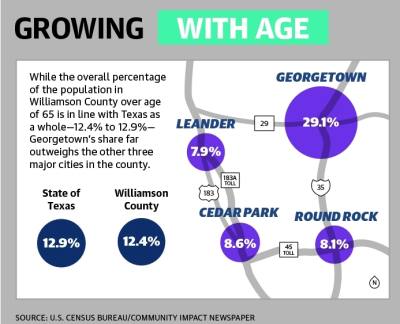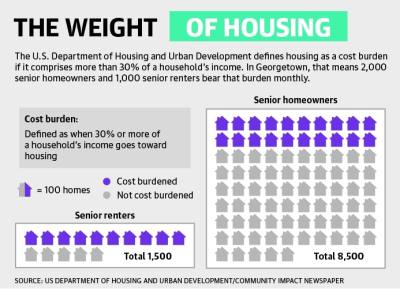As the senior population rises, senior care services and the city of Georgetown and senior caregivers are finding solutions to address emerging challenges seniors face such as housing affordability, more diverse housing options, a shortage of family and professional caregivers, and social isolation, said Andrew Levack, senior program officer for St. David’s Foundation.
“Adults who are trying to age in place need sufficient care as they struggle with functional or cognitive decline, needing in-home care, social engagement and other struggles brought on by the pandemic,” Levack said.
Housing diversity and affordability
The city of Georgetown is working to increase housing options and affordability for all people no matter their income level and age, but especially for seniors, Planning Director Sofia Nelson said. One strategy the city is working on is preserving existing housing options in order to maintain affordability, Nelson said.
Homeowners are getting priced out of their homes, especially those who live in areas with rapid value increases, according to city documents. The U.S. Department of Housing and Urban Development defines an affordable housing option as a unit that costs less than 30 percent of an individual's income. About 67% of senior home renters and 27% of senior homeowners are paying 30% or more of their income on housing, according to the U.S. Census Bureau.
The city enacted a policy to ensure developers making rezoning requests include a senior component to their housing development in exchange for tax credits, Nelson said. This policy will also ensure more housing options for seniors. About 78% of housing options in Georgetown consist of single-family homes, according to the U.S. Census Bureau and the price for a single-family home in Georgetown retirement neighborhoods such as Sun City, Heritage Oaks, Gardens at Verde Vista ranges from $299,000 to over $1 million.
“Seniors are struggling with these things and they also need help with financial support to afford home repairs,” Nelson said. “The city’s Home Repair Program can help with things such as painting, carpentry work, plumbing and electrical work and more. This program is accessible to any resident within Georgetown with limited resources.”
City Council members are keeping the property tax rate as low as possible to reduce further financial burdens on everyone, including seniors who want to age in place in their homes. The property tax rate has dropped 23 cents to $0.401 per $100 valuation since 2017, Communications Manager Keith Hutchinson said. That is the second-lowest property tax rate in the Austin-Round Rock metro, Hutchinson said.
There are other burdens seniors are facing as they attempt to age in place associated with the cost of living, Hutchinson said.
“Aging in place is a goal affected by several factors including housing affordability and housing diversity as well as community support, transportation, engagement, fitness, medical services, and other support services,” Hutchinson said. “Thankfully the city has been seeing more townhome developments, which don’t take as much work to maintain, such as mowing and upkeep of a yard."
Senior caregiver shortage and affordability
Nationwide, senior care facilities and services are facing labor shortages, affecting their ability to provide adequate care, Levack said. The United States is going to need 1.2 million new personal care attendants in the next 10 years, Levack said, with the average pay for the job at $10.14 an hour.
Since job seekers are seeking higher pay to keep up with housing prices, the responsibility is falling on family members to provide their own unpaid care, Levack said.
“The average cost of out-of-pocket private in-home care in 2020 was $55,000 a year in Texas and many seniors don’t have long-term care insurance to help cover this,” Levack said. “A skilled nursing service would cost close to $77,000 in 2020 in Texas.”
The Georgetown Health Foundation and St. David’s Foundation are funding the nonprofit A Gift of Time’s project to build a new adult day health center in Georgetown, Levack said. These facilities are places where seniors experiencing dementia can have cognitive stimulation, connection, health support and two community meals a day. This strategy allows seniors to remain in their homes.
AGE of Central Texas currently runs two adult day health centers in Central Texas. One of the two is located in Round Rock, which is the only adult day health center run by a nonprofit in Williamson County.
“The reason why we aren’t seeing many of these facilities run by nonprofits is because it's hard to make a successful business out of adult day health centers,” Levack said. “The Medicaid reimbursement rate is less than $35 a day, and it costs much more to provide that service. Unfortunately, St. David’s Foundation and Georgetown Health Foundation end up needing to subsidize that care in order to make the business model work.”
Visiting Angels in Georgetown, a senior care service that provides in-home care, is seeing a steady return to its pre-pandemic labor levels, Director of Operations Stacey Scarborough said. However, the organization is struggling to find fill-ins when staff have to step out due to contracting COVID-19 or for other personal reasons, Scarborough said.
“We are also seeing more and more caregivers live further away from Georgetown and commute,” Scarborough said. “A lot of caregivers can’t afford the increasing housing prices in Georgetown and the commute is putting more financial stress on them. This is causing us to not see as many applicants as usual.”
Senior care facilities are experiencing a shortage of experienced applicants as well, said Shannan Conway, director and co-owner of Platinum Resort Assisted Living & Memory Care.
“As we are hiring I am trying to focus more on an applicant's heart and personality than experience,” Conway said. “ I am having to take time away from other duties to train caregivers for three days on the floor. The experienced caregivers we are seeing in our applicant pool have been through many homes, which is a red flag.”
Social isolation
Finding social connection and purpose is already challenging to aging in place when there is not a pandemic happening, Levack said. Seniors are more likely to suffer from loneliness and social isolation, which is just as harmful to an older adult's health as smoking 15 cigarettes a day, according to a 2010 study done by the World Health Organization. Social isolation can cause premature death, a 50% increase in the chance of developing dementia and higher rates of depression and anxiety, Levack said.
To make the house more manageable and reduce social isolation, Platinum Resort caps the number of residents to 16, Conway said. The senior care facility opened Nov. 2, 2020 and plans are being made to create four more locations throughout Georgetown.
Since the senior home opened during the pandemic, Conway said her team had time to research the best way to make their home safe, healthy and sociable. Large windows allow seniors to visit with family separated by glass and the living spaces are large enough to allow socially distanced engagement.
Visiting Angels is also trying to build bridges of social connection for its seniors, Scarborough said. The organization helps with seven non-medical issues related to independent living. Additionally, it sends its caregivers to play games with its seniors and take them to church. Its caregivers also help with transportation to the grocery store, doctor visits and physical therapy.
Another contributor to a senior's social isolation is the lack of family in the area, Scarborough said.
“It's very common for our clients to not have a local family,” Scarborough said. "Many family members are moving all over the country and many seniors are moving to Sun City without a local family. Some seniors also don’t want to burden their children with taking care of them with everything.”
Moving forward
Despite the many challenges and issues that need continuous work and attention, Conway said learning about the needs of Georgetown’s seniors is crucial.
“This is our calling and our purpose, to serve our community and the elderly,” Conway said. “My team and I really feel like this is our way of giving love and personal care to those who have served us before as doctors, lawyers or whatever their jobs were. It’s our way of giving back.”
Aging in place has a lot of factors to keep in mind that everyone involved must plan ahead for, Scarborough said.
“There is a great amount of forward planning in order to execute aging in place well,” Scarborough said. “Know the local resources and sort out a budget and consort with important family members.”




